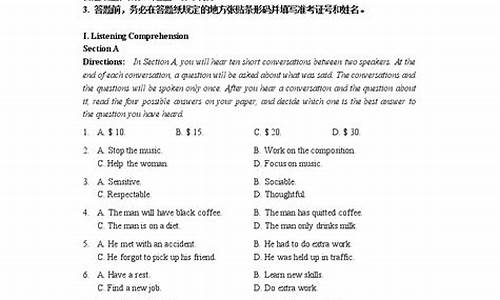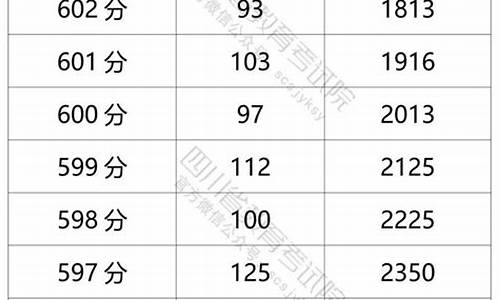您现在的位置是: 首页 > 教育政策 教育政策
2017闵行英语高考二模答案解析_2017闵行英语高考二模
tamoadmin 2024-06-06 人已围观
简介1.高考二模考试科目顺序2.高考英语上海卷哪一年最难3.2017年高考英语备考:关系代词副词的区别4.2017年高考英语词汇详解:advantage句式归纳5.高三英语一模二模和高考哪个难 语法填空题作为一种新型题目,重点考察的是学生的词汇掌握能力、词语辨析、单句理解能力,这就对学生英语综合能力的应用提出了更高的要求。要下面是我为大家推荐的2017高考英语语法填空分类试题,仅供大家参考!
1.高考二模考试科目顺序
2.高考英语上海卷哪一年最难
3.2017年高考英语备考:关系代词副词的区别
4.2017年高考英语词汇详解:advantage句式归纳
5.高三英语一模二模和高考哪个难

语法填空题作为一种新型题目,重点考察的是学生的词汇掌握能力、词语辨析、单句理解能力,这就对学生英语综合能力的应用提出了更高的要求。要下面是我为大家推荐的2017高考英语语法填空分类试题,仅供大家参考!
高考英语语法填空分类试题
一、考查词形转换
1. He must be (mental) disabled.
2. His teacher took a deep drink, smiled (warm), and thanked his student very much for the sweet water.
3. We drank together and talked (merry) till far into the night.
4. One Sunday morning in August I went to a local musical festival. I left it early because I had an appointment (late) that day.
5. This proverb is saying we have to let things go in their (nature) course.
6. But Jane knew from past experience that her (choose) of ties hardly ever pleased her father.
7. Mary felt (please), because there were many empty seats in the room.
8. ?That would be a very (reason) thing to do in a big city, but it could destroy a small village like ours,? Nick said.
9. ?But such a small thing couldn?t (possible) destroy a village.?
参考答案:1. mentally 2.warmly 3.merrily 4.later 5.natural
6.choice7. pleased 8.reasonable 9.possibly
二、考查非谓语动词
1. He spit it out, (say) it was awful.
2. I got on the bus and found a seat near the back, and then I noticed a man (sit) at the front.
3. He suddenly appeared in class one day, (wear) sun glasses.
4. ?In the beginning, there was only a very small amount of unfairness in the world, but everyone added a little, always (think) that it was only small and not very important, and look where we have ended up today.?
5. While she was getting me (settle) into a tiny but clean room, the head of the village was tying up his horse to my car to pull it to a small town some 20 kilometers away where there was a garage.
6. For example, the proverb, ?plucking up a crop (help) it grow?, is based on the following story.
7. She wished that he was as easy (please) as her mother, who was always delighted with perfume.
参考答案 1-7: saying sitting wearing thinking settled to help to please
三、考查谓语动词时态及语态
1. The sun was setting when my car (break) down near a remote and poor village.
2. Besides, shopping at this time of the year was not a pleasant experience: people stepped on your feet or (push) you with their elbows (肘部), hurrying ahead to get to a bargain.
3. He walked in as if he (buy) the school.
4. Her mother was excited. ?Your father has at last decided to stop smoking,? Jane____ (inform).
5. Suddenly, he (find) that he had run out of salt.
参考答案 1-5 :broken pushed had bought was informed found
四、考查形容词或副词的比较级
1. The teacher replied, ?You tasted the water. I tasted the gift. The water was simply the container for an act of kindness and love. Nothing could be (sweet).?
2. He was very tired after doing this for a whole day, but he felt very happy since the crop did ?grow? (high).
3. It might have made it a little (hard) for everybody because it meant they had to turn around, but that didn?t stop the kids in the class.
参考答案 1-3 :sweeter higher harder
高考英语语法填空答题技巧
一、已给单词提示题型的技巧
此类题可以考查学生对单词形式变化的掌握程度。单词形式变化主要有两种,一是词的形、数、式的变化,一是词的派生变化。在判断出词的变化之后还应该进一步审题,看是否需要使用复合的变化形式,这一点是很重要的。
技巧一:名词形式变化。
名词的形式变化主要有单数、复数、所有格的变化。
例:There are many students living at school,the(child) houses are all far from schoo1.
由students一词可以判断出横线处应填复数,且作为houses的定语,所以应用其所有格形式,故答案为child的复合变化形式 复数的所有格children?s。
技巧二:动词形式变化。
动词的形式变化比较多,有谓语的变化(时态、语态、语气),有非谓语的变化(不定式、动名词、现在分词、过去分词)。
例:A talk(give) tomorrow is written by Professor Zhang.
句中的is written是整句的谓语,所以横线所在的动词应当用作非谓语。从tomorrow可以看出,报告是?将来?作的,故用不定式;且报告是give动作的承受者,故可以判断出横线所在处用give的不定式被动式to be given。
技巧三:代词形式变化。
代词形式变化通常是与人称变化有关的三大类五小类,即人称代词(主格和宾格)、物主代词(形容词性和名词性)、反身代词。另外还有几个不定代词的形式变化,如no one/none、other/another等。
例:The king decided to see the painter by(he).
由介词by可以看出,横线处应填反身代词himself。
技巧四:形容词、副词比较级变化。
英语中大部分形容词和表方式的副词都有原级、比较级和最高级的变化。构成比较级和最高级的方式,或通过加后缀一er和.est,或在词前Imore/less和most/least,且形容词的最高级还要冠以the。
例:I am (tall)than Liu Wen.He is the tallest students in my class.
此题后句交代了LiuWen是班上最高的学生,那?我?肯定比他矮,所以不能用taller,只能用表示程度不如的?less tall?。
技巧五:数词形式变化。
数词的形式变化包括基数词、序数词,或加后缀一teen、ty的变化,甚至还有作分母用的序数词的单复数形式,以及one/two的特殊变化形式 once/twice
例:To my three sons I leave my seventeen horses.My eldest son shall take a half,my second son shall take a (three).
从上下文连续起来理解,这是一个分马的计划,大儿子分得a half,也就是?一半?或?二分之一?,那么二儿子应该得?三分之一?,所以要填入作分母的序数词?third?才能命中目标。
技巧六:词的派生。
词的派生现象在英语单词中是很常见的,派生现象主要发生在名词、动词、形容词、副词四种词中。这种题型还有可能检测学生对词根、前后缀、派生词的掌握。
例:Lious lost his wallet yesterday,SO he was very____(happiness).
在这道题中,学生很容易判断出该用形容词;钱包丢了,人应该是不开心的,所以要再加个前缀un,就成了unhappy。
高考二模考试科目顺序
1、150分=140分(笔试)+10分(听说)
笔试考试时间和卷面分值不变,依然是2个小时,总分150。最后折算成140分,和听说成绩相加组成高考英语总分。
2、听说测试与笔试同步,一年两考
17届高考英语可以考两次,投档时取成绩较高的那次。
第一次考试:2017年1月
第二次考试:2017年6月
新增的听说测试,将和笔试同步,也是一年考两次。在计算高考总分时,笔试和听说成绩相对应(即第一次听说成绩只能和第一次笔试成绩折算相加,不可交叉匹配)。
3、听说与“+3”学科一样按等第制计分
听说测试卷面分20分,最后按等第制折算成10分。
大家对“等第制”这个词应该并不陌生,2017届高考实行的“+3”学科考试也是按照等第制计分。
你以为听说测试考了16分,折合以后计入高考的成绩是8分吗?错!
计算成绩时,会将全市所有学生的成绩放到一起,按等级划分,看你的分数是在哪个等级,再给到最终计入高考的成绩。
所以说,这个听说测试成绩没有最好,只有更好!多多练习,提高自己的听说能力,你就有机会拿到满分——10分!
4、听说是人机对话,由机器智能评分
此次新增的听说测试,完全由人工智能机器阅卷,利用最新的语音识别技术和智能评分引擎,对考生的听说能力进行综合评测。
人机对话的形式,对考生来说非常陌生。由于考试应答时间很短,基本不容许出错。
更大的压力还来自于机器的语音识别模式——机器是没有感情的!但是机器是一个程序化的系统,它的评分标准是人为设置好的,我们可以通过专项练习来无限接近人工智能的标准!
高考英语上海卷哪一年最难
语文、数学、文综、理综、英语。
高考二模的考试时间和顺序都是和真正高考一样的。第一天上午8点整至11点半考语文,下午3点至5点考数学。第二天午8点整至11点半考理综/文综,下午3点至5点考英语。
一般情况下,没有特殊原因,每年高考的时间为6月7日和8日,谐音是录取吧。
2017年高考英语备考:关系代词副词的区别
2017年。截止2022年12月3日,根据查询上海市历年英语官网得知,是在2017年高考后,大部分学生反映英语过难,因此2017年的英语上海试卷是非常难得,很多学生英语成绩都普遍较低。
2017年高考英语词汇详解:advantage句式归纳
一、 关系代词和关系副词的区别
1、关系代词(that, who, whom, whose, which)所代替的先行词是人或物的名词或代词,并在句中充当主语、宾语、定语等成分。
例1. Is he the man who/that wants to see you?(who / that在从句中作主语,指人)
例2. He is the man whom/ that I saw yesterday.(whom / that在从句中作宾语,指人)
例3. They rushed over to help the man whose car had broken down.(whose在句中作定语,指人)
例4. Please pass me the book whose (of which) cover is green.(whose在句中作定语,指物。若指物,它还可以同of which互换)
例5. The package (which / that) you are carrying is about to come unwrapped. 你拿的包快散了。(which / that在句中作carry的宾语,指物)
2、关系副词(when, where, why, that)可代替的先行词是时间、地点或理由的名词,在从句中作状语。关系副词when, where, why的含义相当于"介词+ which"结构,因此常常和"介词+ which"结构交替使用。
例6. Beijing is the place where (in which) I was born.
例7. Is this the reason why (for which) he refused our offer?
例8. His father died the year (that / when / in which) he was born.
例9. He can’t find the place (that / where / in which) he lived forty years ago.
二、 判断用关系代词和关系副词
方法1: 用关系代词,还是关系副词完全取决于从句中的谓语动词。及物动词后面无宾语,就必须要求用关系代词;而不及物动词则要求用关系副词。请改错:
1. This is the mountain village where I visited last year.
2. I will never forget the days when I spent in the countryside.
习惯上总把表地点或时间的名词与关系副词 where, when联系在一起。此两题错在关系词的误用上。句1和句2的where, when都应改为which.。
方法2: 准确判断先行词在定语从句中的成分(主、谓、宾、定、状),根据第一点(区别),也能正确选择出关系代词/关系副词。
例10.This museum is ___ you visited a few days age?
A. where B. that C. on which D. the one
例11. This is the museum ____ the exhibition was held.
A. where B. that C. on which D. the one (答案:例1 D,例2 A)
在例10中,所缺部分为宾语,而where, that, on which都不能起到宾语的作用,只有the one既做了主句的表语,又可做从句的宾语,可以省略关系代词,所以应选D。
而例11中, 主、谓、宾俱全,从句部分为句子的状语表地点,既可用副词where,又因 in the museum词组,可用介词in + which 引导地点状语。而此题中,介词on 用的不对,所以选A。
关系词的选择依据在从句中所做的成分,先行词在从句中做主、定、宾语时,选择关系代词 (who, whom, that, which, whose); 先行词在从句中做状语时,应选择关系副词 ( where 地点状语,when 时间状语,why 原因状语)。
方法3:当先行词是all, everything, anything, nothing,the one, much, few, any, little等,或先行词是形容词级时,或在there be 句型中,或当先行行词既有人又有物时,关系代词用that, 而不用which。
例12. Finally, the thief handed everything that he had stolen to the police.
例13. The soldiers and their guns that we sent to the front were lost.
方法4:在引导非限定性定语从句时,和在介词后不能用that,应用which。
例14.(错) The tree, that (改为which)is four hundred years old, is very famous here.
例15.We depend on the land from which we get our food.
高三英语一模二模和高考哪个难
1. have the advantage over 优于,比……占有优势。如:
He has an advantage over me for he knows some French. 由于他懂点法语,所以比我的条件有利。
You have the advantage over me in experience. 你经验比我丰富。
有时用动词 gain, get 等。如:
They gained an advantage over the enemy. 他们比敌人占优势。
2. take advantage of
利用。如:
They took advantage of the fine weather to play tennis. 他们利用好天气去打了网球。
利用。如:
He always took full advantage of the mistakes made by his rivals. 他总是充分利用对手所犯的错误。
欺骗,捉弄,占便宜。如:
He has always been taking advantage of me. 他老是在占我的便宜。
3. to sb’s advantage对某人有利。如:
The present world situation is to our advantage. 目前的世界形势对我们有利。
It will be to your advantage to study abroad. 出国学习将对你有利。
高考难。
根据查询高三网得知,英语作为重要的大学招生考试科目之一,对学生的英语学习成果和综合能力有较高的要求。高考英语试卷通常会覆盖听力、阅读、写作和翻译等多个方面,并且在文法、词汇、语言运用等方面会相对更加深入和复杂。此外,高考英语通常会有一定的时间限制,需要学生在有限的时间内完成各个题型,并进行综合性的运用和应用。
一模和二模则是学校为了帮助学生适应高考的考试模式和提升应试能力而设立的模拟考试。一模和二模的难度可能会与高考相对接近,但一般来说还是会相对简化和缩小范围,以帮助学生更好地备考和复习。所以高考英语的难度通常会比一模和二模要高一些。









